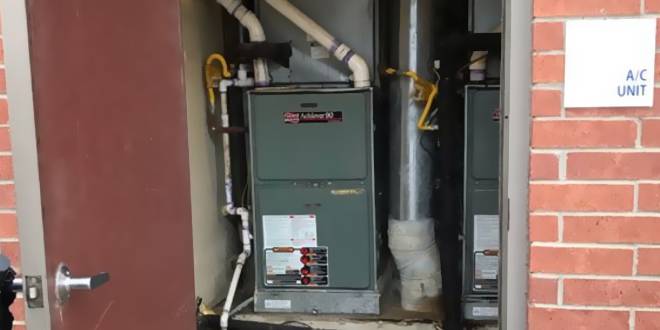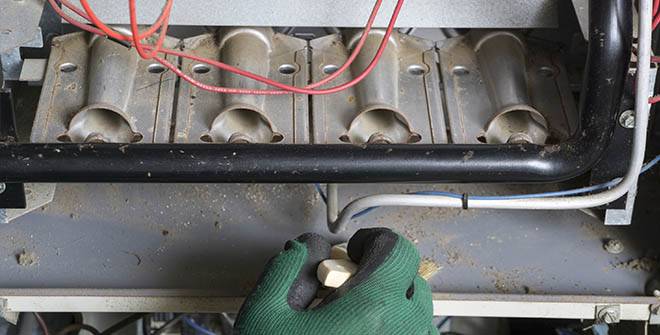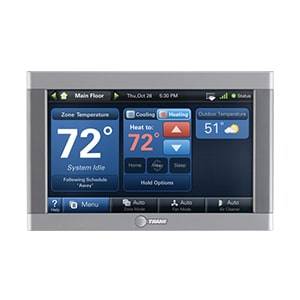
Ensuring your home’s heating system is efficient in Irving, TX, is crucial for comfort and cost savings. Discover practical tips and expert advice on how to increase the efficiency of your heating system, keeping your space warm and cozy throughout the chilly seasons.
Schedule Regular Maintenance:
Regular maintenance is essential for keeping your heating system running efficiently and prolonging its lifespan. By scheduling an annual inspection and tune-up with a professional HVAC technician, you can ensure that your system is in top condition and ready to keep you warm throughout the winter.
During a typical maintenance visit, a qualified technician will perform a thorough inspection of your heating system. They will check for any signs of wear and tear, clean or replace air filters, and lubricate moving parts to ensure smooth operation. The technician will also inspect the thermostat to ensure it is functioning correctly and calibrate it if necessary.
As part of Spencer’s Comfort Maintenance Plan, you can enjoy the peace of mind knowing that your heating system is well-maintained and operating efficiently. The plan includes a 21-point check-up performed by a Spencer technician twice a year, a 10-15% discount on all repairs performed by Spencer Air Conditioning, and a 2-year or lifetime warranty on all repairs made under the plan.
Regular maintenance not only ensures that your heating system is operating efficiently but also helps prevent unexpected breakdowns and costly repairs. By investing in regular maintenance, you can extend the life of your heating system and enjoy a warm and comfortable home all winter long.

Replace Air Filters Regularly:
Dirty air filters can significantly impact the efficiency of your heating system. They can restrict airflow, causing your system to work harder and consume more energy. To ensure your system runs smoothly, it’s important to replace air filters regularly.
How to Replace Air Filters:
Locate the Air Filter: The air filter is usually located near the air handler or furnace. It may be behind a panel or grille that can be easily removed.
Turn off the System: Before replacing the air filter, turn off your heating system to prevent any debris from entering the system.
Remove the Old Filter: Carefully remove the old air filter from its housing. Note the direction of airflow indicated on the filter, as you’ll need to install the new filter in the same orientation.
Install the New Filter: Slide the new air filter into place, making sure it fits securely in the housing. Ensure that the airflow direction arrow on the filter is pointing towards the blower motor.
Close the Panel or Grille: Once the new filter is installed, close the panel or grille securely.
Turn on the System: Finally, turn on your heating system and check that the new filter is properly installed and that there are no leaks or issues with airflow.
Frequency of Replacement:
Air filters should be replaced every 1-3 months, depending on several factors such as the type of filter, the amount of dust and debris in your home, and whether you have pets. Check the manufacturer’s recommendations for your specific filter type.
By regularly replacing your air filters, you can ensure that your heating system operates efficiently, saving you money on energy costs and prolonging the life of your system.
Seal Air Leaks:
Air leaks around windows, doors, and ductwork can significantly impact the efficiency of your heating system. These leaks allow warm air to escape and cold air to enter your home, forcing your heating system to work harder to maintain a comfortable temperature. By sealing these leaks, you can improve the efficiency of your heating system and reduce energy waste.
How to Locate Air Leaks:
Visual Inspection: Inspect windows, doors, and areas where different building materials meet for any visible gaps or cracks.
Use a Candle or Incense Stick: On a windy day, hold a lit candle or incense stick near windows, doors, and other potential leak areas. If the flame flickers or the smoke moves horizontally, there may be an air leak.
Check Ductwork: Inspect the ductwork in your home for any visible gaps, holes, or disconnected joints.
How to Seal Air Leaks:
Weatherstripping: Use weatherstripping around windows and doors to seal gaps and prevent air leaks. Weatherstripping comes in various materials, such as foam, rubber, and vinyl, and can be easily applied with adhesive backing.
Caulking: Caulk can be used to seal gaps and cracks in walls, ceilings, and around window and door frames. Choose a caulk that is appropriate for the material you are sealing and apply it carefully to ensure a tight seal.
Insulation: Insulate any exposed pipes or ductwork to prevent heat loss and improve energy efficiency.
By sealing air leaks in your home, you can improve the efficiency of your heating system and reduce your energy bills. Regularly inspecting your home for air leaks and sealing them promptly can help keep your home warm and comfortable while saving you money on heating costs. If you’re ever unsure, don’t hesitate to call us at Spencer Air Conditioning and Heating.
Upgrade Your Thermostat:
Upgrading to a programmable thermostat is a simple and cost-effective way to increase the efficiency of your heating system. Programmable thermostats allow you to set different temperatures for different times of the day, ensuring that your heating system is not running when it’s not needed, saving energy and money.
How Programmable Thermostats Work:

Set Your Schedule: Programmable thermostats allow you to create a heating schedule based on your daily routine. You can set the thermostat to lower the temperature when you’re away from home or asleep, and raise it when you’re awake and active.
Zoned Heating: Some programmable thermostats also support zoned heating, allowing you to set different temperatures for different areas of your home. This can help you further customize your heating schedule and save even more energy.
Remote Access: Many modern programmable thermostats also offer remote access via smartphone apps. This allows you to adjust your heating schedule from anywhere, ensuring that your home is always at the optimal temperature.
Consider Zone Heating:
Zone heating is a smart and efficient way to heat your home, especially if you have areas of your house that are not frequently used. Instead of heating the entire house to the same temperature, zone heating allows you to heat only the areas that are in use, saving energy and increasing efficiency.
How Zone Heating Works:
Zone Control System: A zone control system divides your home into separate zones, each controlled by its own thermostat. You can then set different temperatures for each zone based on your heating needs.
Dampers and Valves: Dampers or valves installed in the ductwork control the flow of heated air to each zone. When a zone is not in use, the damper or valve closes, preventing heated air from entering that zone.
Increased Comfort: Zone heating can also increase comfort in your home by allowing you to customize the temperature in each zone to suit the preferences of the occupants.
Benefits of Zone Heating:
Energy Savings: By heating only the areas of your home that are in use, zone heating can significantly reduce energy consumption and lower your heating bills.
Increased Efficiency: Zone heating increases the efficiency of your heating system by reducing the workload. Your heating system doesn’t have to work as hard to maintain a comfortable temperature, prolonging its lifespan.
Customized Comfort: Zone heating allows you to customize the temperature in each zone of your home, ensuring that everyone is comfortable.
How to Implement Zone Heating:
Install a Zone Control System: To implement zone heating, you’ll need to install a zone control system in your home. This system includes thermostats for each zone and dampers or valves in the ductwork. It’s important to have a professional HVAC technician install your zone control system to ensure that it is done correctly and safely.
Set Up Zones: Once your zone control system is installed, you can set up zones based on the layout of your home and your heating needs. Each zone should include areas that are frequently used together.
Insulate Your Home:
Proper insulation can help prevent heat loss and improve the efficiency of your heating system. Insulate your attic, walls, and floors to keep warm air inside and reduce your heating costs.
Upgrade to a High-Efficiency Heating System:
If your heating system is old and inefficient, consider upgrading to a newer, high-efficiency model, like a heat pump for example. Newer systems are more energy-efficient and can save you money on your heating bills.
Use Ceiling Fans:
Ceiling fans can help distribute warm air more evenly throughout your home, allowing you to lower your thermostat and save energy without sacrificing comfort.
Close Curtains at Night:
Closing curtains or blinds at night can help insulate your windows and prevent heat loss, keeping your home warmer and more energy-efficient.
Monitor Your Heating System’s Performance:
Keeping an eye on your heating system’s performance is essential to ensure it operates efficiently and effectively. Regular monitoring can help you catch potential issues early and prevent costly repairs or breakdowns. Here are some key aspects to pay attention to:
Efficiency: Monitor your heating system’s energy usage. An increase in energy bills without a corresponding increase in usage could indicate that your system is not operating efficiently.
Airflow: Check for consistent airflow from your vents. Uneven or weak airflow could indicate a problem with your ductwork or blower motor.
Temperature Consistency: Ensure that your home is heating evenly. Cold spots or rooms that are consistently colder than others may indicate an issue with your heating system.
Strange Noises: Listen for any strange noises coming from your heating system, such as banging, rattling, or squealing. These noises could be a sign of a mechanical problem that requires attention.
Odors: Pay attention to any unusual odors coming from your heating system. Musty or burning smells could indicate a problem with your system that needs to be addressed.
Thermostat Accuracy: Check that your thermostat is accurately reading and maintaining the temperature you set. Inaccurate readings could indicate a problem with your thermostat or heating system.
When to Contact a Professional:
If you notice any issues with your heating system, such as strange noises, uneven heating, or increased energy bills, it’s important to contact a professional HVAC technician for repairs. Attempting to fix these issues yourself could lead to further damage or void your system’s warranty.
A professional HVAC technician can diagnose the problem and recommend the appropriate repairs or maintenance to ensure your heating system continues to operate efficiently. Regular maintenance and timely repairs can help prolong the life of your heating system and keep your home comfortable all winter long.
Ready to increase the efficiency of your home’s heating system?
Contact Spencer Air Conditioning and Heating today for expert advice and professional HVAC services. Keep your home warm and cozy all winter long! #WarmAndCozy #SpencerAirConditioningHeating 🔥🏠





